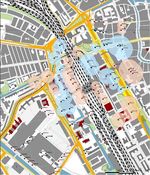Theme 5: Smart monitoring
Give brains to urban energy systems
We need:
• Energy systems with maximum efficiency under all circumstances.
• Consumers participating in the energy transition through smart home appliances and smart grids.
• Smart and ethical use of data for demand/supply match and system optimisation.
Research challenges
• Self-learning and self-optimising energy management systems.
• Advanced energy diagnosis systems.
• Multi-objective optimisation: energy, comfort, air quality and costs.
• Privacy by design.
• Big data for a better understanding of occupant behaviour and energy rebound.
• Big data for real-time performance assessment.
Examples of TU Delft projects
 Aquifer Thermal Energy Storage Smart Grids
Aquifer Thermal Energy Storage Smart Grids
The proposed research aims to test, implement, and evaluate algorithms and methodologies being developed within the Aquifer Thermal Energy Storage (ATES) Smart Grids project. In particular, we plan to apply the proposed distributed model predictive controllers (DMPC) in interdependent building-ATES control systems. For this study, we investigate integrated ATES solutions for Amsterdam at a regional scale, and also focus on three musea and several other large buildings near the Museumplein in Amsterdam as a specific test and implementation site. <link en departments delft-center-for-systems-and-control research networked-cyber-physical-systems aquifer-thermal-energy-storage-smart-grids _blank>Read more.
Smart-meter data for automated energy and comfort diagnosis in homes
Smart-meter data at several aggregation levels (place and time) support the development of better prediction models for energy consumption in dwellings. With these models, based on actual energy use and behaviour, much more accurate energy savings potentials can be determined at the house, block or neighbourhood levels. Thermal sensation data and diverse physical parameters are gathered in real time in order to learn about the occupant’s wishes and behaviour. TU Delft explores this topic in various projects with multiple industry partners.
An energy-neutral office through the Internet of Things
An office building in Rijswijk is used as a test environment to demonstrate how an energy-neutral office can be achieved through using the Internet of Things (IoT) and smart controls. TU Delft has been working on how to use the data collected by the IoT platform to design self-learning controls that reduce energy consumption and increase comfort. The Dutch Government Real Estate Agency (Rijksvastgoedbedrijf) has established the test environment in Rijswijk as one of the initiatives in the Green Technologies 3.0 programme.
Contact for this theme is Tamas Keviczky
More Information
People
Education
Research and Projects
